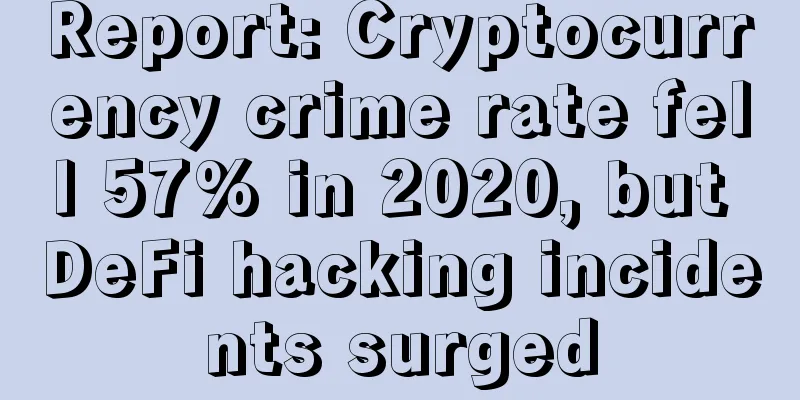Report: Cryptocurrency crime rate fell 57% in 2020, but DeFi hacking incidents surged

|
According to blockchain security firm CipherTrace, crime targeting the virtual currency sector more than halved in 2020. The company’s 2020 Crypto Crime and Anti-Money Laundering Report shows that losses from cryptocurrency theft, hacking and fraud fell 57% to $1.9 billion in 2020, down from a record $4.5 billion in 2019, largely due to improved security systems. CipherTrace said that in the past two years, "large-scale exit scams" accounted for the majority of cryptocurrency crimes, such as the PlusToken Ponzi scheme alone, which netted $2.9 billion. In 2020, a similar scam called WoToken in the same crime defrauded $1.1 billion from investors, accounting for 58% of the amount of fraud in major crimes in 2020. CipherTrace’s report found that fraud was the leading cryptocurrency crime, followed by theft and ransomware. CipherTrace CEO Dave Jevans told Reuters: “As these financial institutions mature and implement stronger security measures, thefts from centralized exchanges continue to decline,” However, 2020 has witnessed a surge in decentralized finance-related crimes, most of which are "rug pulls". In this case, tokens are artificially hyped and issued, and minters and early investors sell them all after the tokens rise, causing losses to latecomers. The report explains that some bad actors will liquidate the entire liquidity pool, leaving the remaining token holders without access to liquidity and unable to trade, thus wiping out the remaining value of the tokens: “Half of the cryptocurrency attacks in 2020 occurred on DeFi protocols, which were almost a negligible pattern in previous years, and in the second half of 2020, nearly 99% of the funds defrauded in major fraud incidents came from ‘rug pulls’ DeFi protocols and other exit scams. This exit scam model is reminiscent of the terrible ICO craze in 2017.” Jevans added that, because they are mostly unregulated, DeFi protocols are not subject to most of the traditional enforcement mechanisms faced by centralized exchanges, money services businesses, and banks. The report noted that the largest theft in 2020, the theft of $281 million from centralized exchange KuCoin, also involved the DeFi sector as criminals attempted to launder the funds through Uniswap, the world’s largest decentralized exchange. As a blockchain news and information platform, Cointelegraph Chinese only provides personal opinions of the author, has nothing to do with the position of Cointelegraph Chinese platform, and does not constitute any investment and financial advice. If you need to reprint, please contact the relevant staff of Cointelegraph Chinese. |
<<: Liu Jibin: Closed-loop mining, a must-have for capital to enter the market
>>: US stock investors are hurt, but the crypto market may be the biggest winner
Recommend
What is the difference between the "Chuan" palm and the "Bian" palm? Analysis of the "Chuan" palm
A "川" palm refers to a pattern on the p...
Women with low IQ are destined to lead a hard life according to facial features
By looking at a person's face, you can know t...
Zhu Lingling's face Zhu Lingling's face destiny analysis
I believe everyone knows the diving queen Guo Jin...
Men with certain facial features are likely to become rich! Facial features analysis!
Everyone desires wealth, and wealth is related to...
Which moles on the face should not be removed?
In daily life, there are always some friends or n...
It’s finally here! A comprehensive explanation of the new features of Uniswap V3
introduce What is the long-awaited Uniswap V3 all...
Palmistry Health Lines Palmistry Health Lines
Have you heard of palm lines to predict health? T...
Illustration of fortune telling based on evacuated eyebrows
Sparse eyebrows indicate financial gain or loss [...
What does it mean to have a mole between the eyebrows?
In physiognomy, judging whether a person's fa...
Where are the nasolabial folds? What do deep nasolabial folds mean?
In ancient China, those who held public power wer...
Following the establishment of supervision in the United States and Japan, South Korea and Dubai began to regulate Bitcoin
Following the United States and Japan in establis...
Ethereum Ropsten Testnet Merge Coming Soon: What to Watch Out For?
Ethereum public testnet Ropsten is moving to proo...
Is it good fortune for people with big noses and moles? How to distinguish good and bad moles?
Everyone's fortune is different. Some people h...
Men who are born afraid of their wives
Men who are born afraid of their wives There was ...
How to quickly resolve the black spot on the forehead? Will the black spot on the forehead bring disaster?
Speaking of a black forehead, do you think of the...









